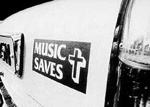A month or so ago, a friend of mine told me to check out a local band called Drop Trio. He said they were a great jazz-funk trio in the same vein as Medeski, Martin and Wood. With a comparison like that, who could resist? I immediately found their web site, downloaded some music, liked what I heard, and contacted the band for an interview.
Drop Trio’s keyboardist, Ian Varley (who has his own blog), graciously agreed to answer some questions for Houston Calling.
The band–Mike Blattel on drums, Marc Reczek on bass, and Ian Varley on keys–plays their next show at an in-store performance at Cactus Music this Sunday, 9.28.03.
Ten Questions for Drop Trio
HC: How did Drop Trio get started?
Ian: Drop Trio got its start when I moved to Houston from San Francisco, in the fall of 2002. Ian found Mike through a posting on the Jazz Houston web site. We got together to play in Mike’s living room, and found instant musical chemistry–in our first jam session, we spontaneously composed two songs (“Melody-Melody” and “2nd First,” both of which would later make the cut for our first album). We quickly brought in Nino Batista, a friend of Mike’s, on bass, and started practicing and writing like mad. Several months later, when Nino had to step down because of personal obligations, we found Marc Reczek, an already busy local musician (guitarist for Little Brother Project). We clicked right away, so much so that Marc decided to join up full time with us on bass.
HC: What do consider to be your musical influences?
Ian: All of us have a pretty diverse set of musical loves, but as for the ones that directly influence Drop Trio’s music, there are obvious ones like MMW, The Meters, John Scofield, OM Trio, Jacob Fred Jazz Oddyssey, Stanton Moore, etc.; and less obvious ones like Phish, Bill Evans, Yes, Rush, Bach.
HC: You released Big Dipper, your first album, in June and were also nominated for several Houston Press music awards this year. How is your music being received in the Houston area so far?
There’s definitely a buzz around town–lots of people are into this style of music, and there aren’t any other bands out there doing exactly what we’re doing. The trick is just getting the word out to more people–we’re independent and can’t afford massive marketing efforts. But we’re making strides, one gig at a time–our Houston mailing has gone from 30 to 230 in about 6 months, and our album is really starting to sell, so we see those as good signs that Houston is ready for us.
HC: When I was first introduced to your music, a friend touted it as being very “Medeski-ish.” Do you get the comparisons to MMW a lot because of the music you play or is that primarily because you’re a trio? Are you flattered or bothered by that description?
Ian: We hear that a fair amount as well, naturally, and we probably do as much to encourage it as to discourage it. I mean, we even cover a couple MMW tunes, because they pull in people who might otherwise not notice us. We are big fans of MMW, without a doubt–they are amazing, and they’ve done more than anybody else to get this style of music in the popular consciousness. On the other hand, our music is pretty different when you get down to brass tacks. You would never mistake a Drop Trio original for a MMW original, there are definite distinct elements that make each one unique. So overall, we are flattered by the comparison and hope that people who really like MMW will give us a deep enough listen to hear that we’re going for something similar but unique.
HC: I noticed you are taking full advantage of the internet as a tool to market Drop Trio and have several MP3s available on your site, as well as some streaming concerts. I am sure by now you’ve heard the RIAA is fining college students and parents all over the nation for sharing music online. Overall, are you for or against the MP3 “revolution”?
Ian: As has been said many times, the people who are really hurt by music sharing are the record companies and millionaire artists, not your average working musician. That said, copyright and an artist’s right to profit from their music is totally legitimate and necessary. I think Janis Ian put it really well in her article “The Internet Debacle.” In the end, artists should depend for their living on the people who love their art, and so our plan is just to cultivate that relationship–with our fans–and rely on them to buy our records, our concert tickets, etc. The ones who care will always go for the full production. You have to evolve with the times.
HC: What is the one description that you hate to hear about your music?
Ian: We get this a lot: “You guys are great, but you really need a singer!” That’s the most onerous one. We don’t need a singer! That’s totally contrary to what we’re going for. We focus on writing good melodies, so I can see why some people would be jonesing for some vocal parts to go along with it, but that’s just not what we’re about.
HC: What’s your take on the state of the music industry?
Ian: Amazing–this is really a turning point in the music business. It’s like there are two distinct worlds, totally out of sync with each other. There’s the international big corporate world described perfectly by Steve Albini in “The Problem With Music,” where artists get chewed up and spit out, and consumers are fed the most consistently mediocre crap, year after year. That’s how it’s been, and it’s getting worse.
But then there’s the other side–tens of thousands of great independent local, regional and national artists who make a living playing and touring, and reach people through the internet, on a small operating budget. Any band can publish their own music for under $10 a month on a web site, and make a decent album for a few thousand dollars. That’s the kind of expense that’s recoupable by anybody, and the connections with fans are real and lasting. In this scene, it doesn’t matter if you are “commercially marketable”; if you do something that people really like, even a few people, you can build a loyal fanbase; they can always find you (through your web site), and you can always contact them (through an email list). It’s an independent’s dream.
HC: If you could have any band/musician cover one of your songs, what song would it be and what band/musician?
Ian: Kronos Quartet playing “Invisible Pants”; John Scofield covering “Melody-Melody”; and Bobby McFarrin covering “Wallawalla” a cappella. Now there’s a tribute album.
HC: What’s next for your band?
Ian: 2004: Replace the band on Jay Leno’s show
2005: “Wet Dog” picked as new national anthem
2006: Write “Funk Jazz Rules” on the wall of every bathroom from here to Taiwan
2007: Get a show at Numbers
2008: Retire as wealthy thousandaires
HC: What is in your CD player right now?
Ian: Bill Evans, Everybody Digs; Wendy Carlos, Switched on Bach; Yes, The Yes Album
Mike: The Bad Plus, These are Vistas; Rush, Hemispheres; Cannonball Adderly, Inside Straight
Marc: Trey Anastasio Band, Plasma; Widespread Panic, Live; Wes Montgomery, Boss Guitar
Visit Drop Trio’s website at www.droptrio.com–you can download posters, press info, live MP3s, and more. And don’t forget to buy your copy of Drop Trio’s CD, Big Dipper.
Visit Ian’s blog. Drop Trio’s blog is here.
See you at the shows.
Now Playing in My iPOD: Alta May — “Icepick”



